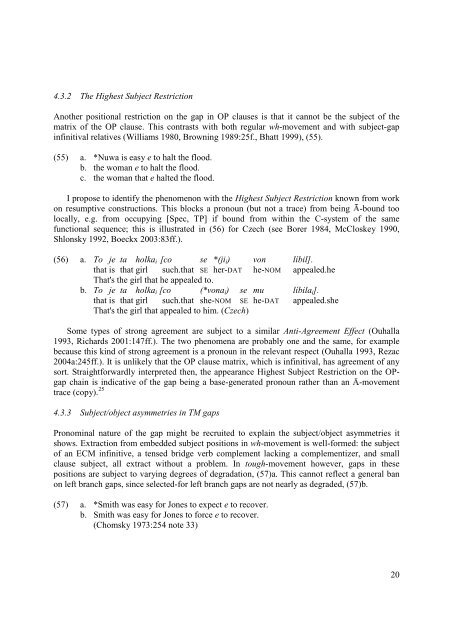1 On tough-movement* Milan Rezac, University ... - Multimania.co.uk
1 On tough-movement* Milan Rezac, University ... - Multimania.co.uk
1 On tough-movement* Milan Rezac, University ... - Multimania.co.uk
Create successful ePaper yourself
Turn your PDF publications into a flip-book with our unique Google optimized e-Paper software.
4.3.2 The Highest Subject Restriction<br />
Another positional restriction on the gap in OP clauses is that it cannot be the subject of the<br />
matrix of the OP clause. This <strong>co</strong>ntrasts with both regular wh-movement and with subject-gap<br />
infinitival relatives (Williams 1980, Browning 1989:25f., Bhatt 1999), (55).<br />
(55) a. *Nuwa is easy e to halt the flood.<br />
b. the woman e to halt the flood.<br />
c. the woman that e halted the flood.<br />
I propose to identify the phenomenon with the Highest Subject Restriction known from work<br />
on resumptive <strong>co</strong>nstructions. This blocks a pronoun (but not a trace) from being Ā-bound too<br />
locally, e.g. from occupying [Spec, TP] if bound from within the C-system of the same<br />
functional sequence; this is illustrated in (56) for Czech (see Borer 1984, McCloskey 1990,<br />
Shlonsky 1992, Boeckx 2003:83ff.).<br />
(56) a. To je ta holka i [<strong>co</strong> se *(ji i ) von líbil].<br />
that is that girl such.that SE her-DAT he-NOM appealed.he<br />
That's the girl that he appealed to.<br />
b. To je ta holka i [<strong>co</strong> (*vona i ) se mu líbila i ].<br />
that is that girl such.that she-NOM SE he-DAT appealed.she<br />
That's the girl that appealed to him. (Czech)<br />
Some types of strong agreement are subject to a similar Anti-Agreement Effect (Ouhalla<br />
1993, Richards 2001:147ff.). The two phenomena are probably one and the same, for example<br />
because this kind of strong agreement is a pronoun in the relevant respect (Ouhalla 1993, <strong>Rezac</strong><br />
2004a:245ff.). It is unlikely that the OP clause matrix, which is infinitival, has agreement of any<br />
sort. Straightforwardly interpreted then, the appearance Highest Subject Restriction on the OPgap<br />
chain is indicative of the gap being a base-generated pronoun rather than an Ā-movement<br />
trace (<strong>co</strong>py). 25<br />
4.3.3 Subject/object asymmetries in TM gaps<br />
Pronominal nature of the gap might be recruited to explain the subject/object asymmetries it<br />
shows. Extraction from embedded subject positions in wh-movement is well-formed: the subject<br />
of an ECM infinitive, a tensed bridge verb <strong>co</strong>mplement lacking a <strong>co</strong>mplementizer, and small<br />
clause subject, all extract without a problem. In <strong>tough</strong>-movement however, gaps in these<br />
positions are subject to varying degrees of degradation, (57)a. This cannot reflect a general ban<br />
on left branch gaps, since selected-for left branch gaps are not nearly as degraded, (57)b.<br />
(57) a. *Smith was easy for Jones to expect e to re<strong>co</strong>ver.<br />
b. Smith was easy for Jones to force e to re<strong>co</strong>ver.<br />
(Chomsky 1973:254 note 33)<br />
20
















